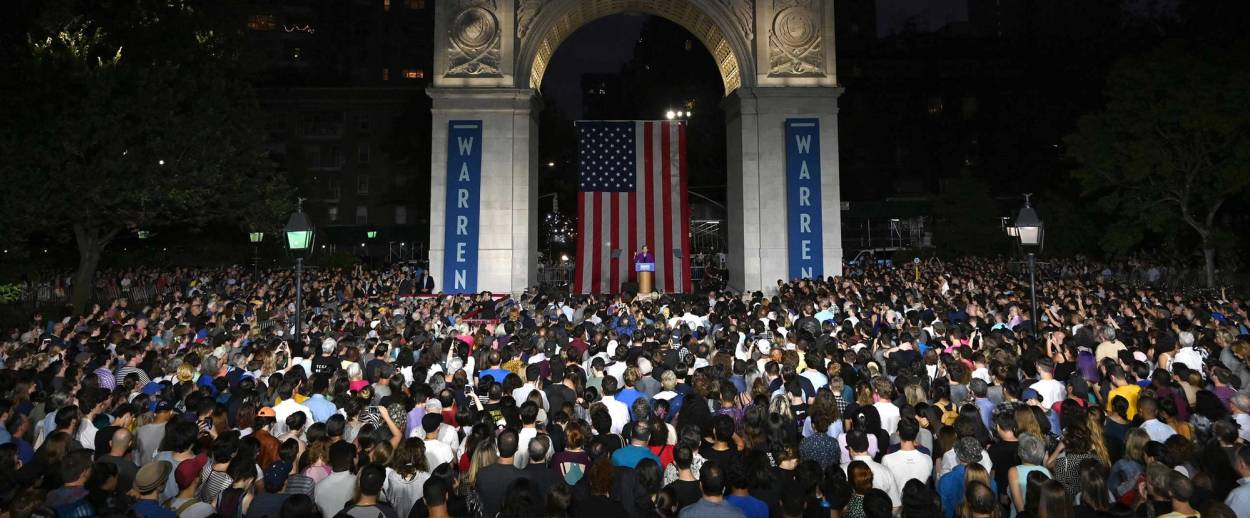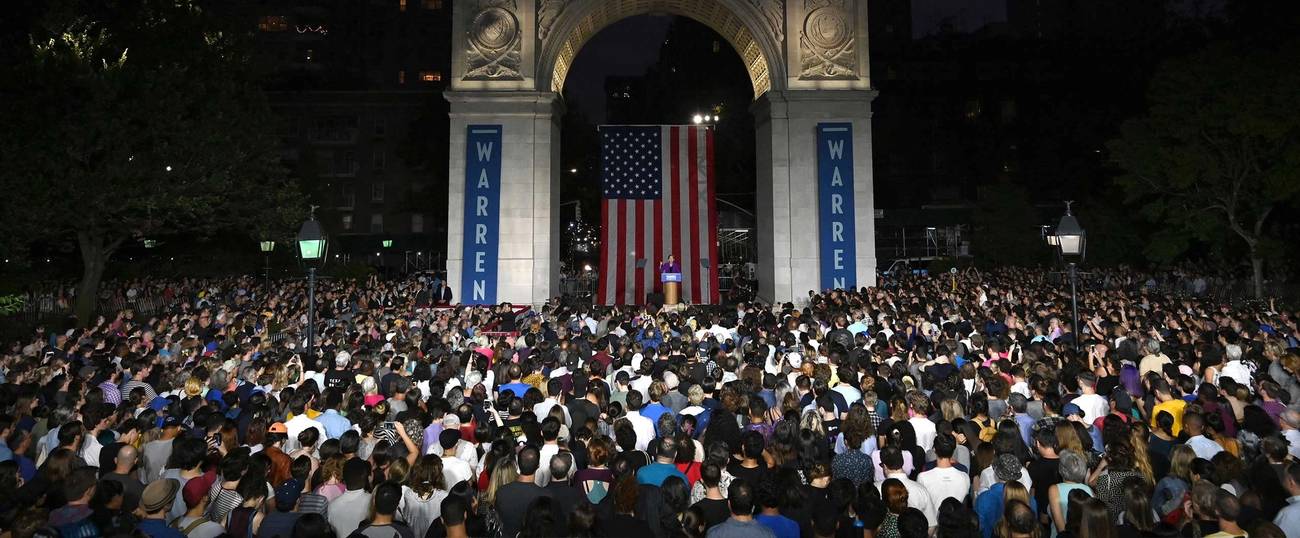Elizabeth Warren in Washington Square
At last night’s rally, reviving the spirit of Frances Perkins




Elizabeth Warren’s oration in New York’s Washington Square last night had me, as they say, at go—though I do have to wonder if, in the entire crowd of several thousand, with its New York University students, professors, staffers, hipsters, random citizens, drug dealers, and its committed Democrats and Warren volunteers, anyone at all responded the way I did. Sen. Warren orated from a platform at the Washington Square Arch, and go, for her, was the Triangle Shirtwaist factory fire of 1911, which took place one short block away. She evoked the fire itself; the flames leaping from the upper floors; the workers trying to escape; the locked exits; the workers climbing out to the 11th-floor ledge and leaping to their deaths; the dreadful fatal thumps on the sidewalk; and the 146 victims, Jews and Italians, as she pointed out (which was her only reference to Jews, Italians, or any other ethnic group, except for the blacks and browns and the Native Americans, later in the speech).
I found it very moving. I am the sort of person who was brought up to remember the Triangle Shirtwaist fire, and how terrible it was, and how excellent was the International Ladies Garment Workers Union, which grew stronger and won many victories in response to the fire. And, at Washington Square just now, the Triangle Shirtwaist fire was go because everything else in Sen. Warren’s speech went from there. The cause of the disaster, she told the crowd, was corruption in the interest of corporate profits, which prevented the regulators from regulating. And corruption of a similar nature is the cause of the sundry calamities of our own time in matters of gun violence (because of the power of the arms manufacturers), and forest fires and other results of climate change (because of the power of various other corporations), and sundry instances of racial injustice (because of the power of still other corporations), and so on.
The insistent emphasis on corruption was a bit simple, analytically speaking. But it allowed her to say, in one of the climaxes of the speech, “Donald Trump is corruption in the flesh,” which hinted rather elegantly at corruption of the flesh, as well, and was, in any case, a pleasingly aggressive remark. It is fine and good to “go high,” as per Michelle Obama; and Sen. Warren’s speech was notable in its civilized avoidance of personal attacks. But even a civilized oration ought to sock it to the nose, at least once.
The Triangle Shirtwaist fire also allowed the senator to hint at her own role in today’s events. She informed the crowd that, after the fire, the trade union movement brought out half a million people to march on Fifth Avenue. And a great hero emerged, who, instead of marching in the streets, worked the corridors of power. This was someone named Frances Perkins, who lobbied for fire safety and workers’ rights in Albany, and went on from there to become President Franklin D. Roosevelt’s secretary of labor, where she helped preside over a series of vast government programs, from social security to regulation of the workday.
So we learned that Elizabeth Warren identifies with Frances Perkins. She is a progressive—that is, a progressive in the historic American sense, which means the anti-corruption, high-minded, wonkily sophisticated reform style of a century ago. But has anyone heard of Frances Perkins? A significant portion of the crowd applauded the name, which was wonderful for an old bookworm like me to see. But the election is not going to turn on this point, I hope.
There was another purpose in invoking a hero of the past. Sen. Warren said, as if in capital letters, “We need BIG STRUCTURAL CHANGE.” And, in rebuttal to anyone who says that capital-letter reforms are too much to ask of modern America, she pointed out that, in the past, BIG STRUCTURAL CHANGE has gone down well among Americans—as shown by the New Deal policies of Frances Perkins. Sen. Warren invoked the larger history of radical reform, from the abolition of slavery to the rise of the trade unions to women’s suffrage to the New Deal and the civil rights revolution and the movement for LGBT rights, and beyond—all of which has shown that, time and again, Americans do welcome the chance to become a little more democratic. She could have broadened her point and made it more powerful, I think, by bringing in George Washington, whose statue presides over the Arch and over the entire square—Washington, who was the father of his country because he was the leader of a revolution, which makes him the father of radical reform. A revolution is a very nice national origin to have.
So I was happy about the history lecture. Then again, I have worried that, after eight years of President Barack Obama, large numbers of voters defected to Donald Trump not because Obama is black, but because Obama, deep in his soul, is a professor.
It was an oddity of Warren’s speech that foreign policy came up not at all, except in her promise, as part of her anti-corruption plan, to bring to an end the American custom of bestowing ambassadorships on campaign contributors. Does she have no large ideas about foreign policy? She does; she has expounded them in Foreign Affairs magazine. They lean this way, and that—for an affirmation of American ideals around the world, and, then again, for what sounds like an American withdrawal from affirming its ideals. At Washington Square, I worried that, in order to please the kind of crowd that might be expected from NYU, she was going to emphasize the withdrawal, instead of the affirmation. She said nothing at all. It was perplexing. Through the crowd, however, came a leafleter from the Democratic Socialists of America, passing out a flyer proclaiming, “No War No Sanctions on Iran,” and roundly denouncing Elizabeth Warren for having voted not only in favor of a defense budget, but in favor of sanctions. Which warmed me to Elizabeth Warren.
But mostly I found myself reflecting that something is marvelous about America, in spite of everything. It might have been Aretha Franklin and Johnny Cash and the Temptations on the sound system. Or it might have been Washington Square and its statue of Giuseppe Garibaldi, which was erected in expression of an American spirit, now greatly diminished, of solidarity with democratic movements in other parts of the world. Or it was professor Warren’s lecture about the trade unionists of 1911 and the reforms of Frances Perkins. Or it was the whole thing—the city architecture, the 19th-century statuary on revolutionary themes, the invocation of radical traditions, together with the good humor of the crowd, and the woman next to me who volunteered that she hates Donald Trump, and the people who, after the speechmaking was done, began to dance.
***
To read more of Paul Berman’s political and cultural criticism for Tablet, click here.
Paul Berman is Tablet’s critic-at-large. He is the author of A Tale of Two Utopias, Terror and Liberalism, Power and the Idealists, and The Flight of the Intellectuals.